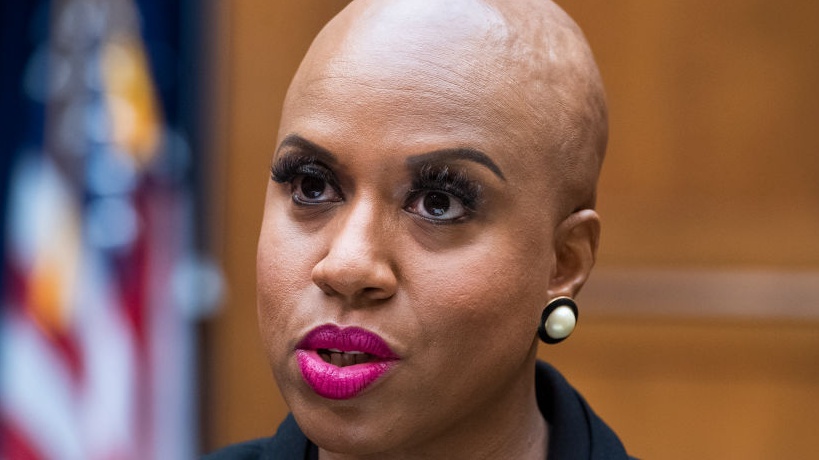U.S. Rep. Ayanna Pressley (D-MA) clapped back at trolls shaming her for having alopecia.
On Tuesday, Pressley tweeted what seemed to be a response to the haters commenting on her look.
"The ignorance of the trolls on my TL. No," the congresswoman wrote. "Hair is not infrastructure. But childcare, paid leave, home & community based svs, housing, climate resiliency & a pathway to citizenship for our immigrant neighbors IS human infra. I'll keep holding the line as tight as these cheekbones."
The ignorance of the trolls on my TL. No. Hair is not infrastructure. But childcare, paid leave, home & community based svs, housing, climate resiliency & a pathway to citizenship for our immigrant neighbors IS human infra. I'll keep holding the line as tight as these cheekbones. pic.twitter.com/V7XTYjfvte
— Ayanna Pressley (@AyannaPressley) September 29, 2021
Pressley's followers met her with support.
Friend, KEEP DOING.
You've got plenty of backup here. pic.twitter.com/rMuCJkMsEE
— Amanda Finley Digs All The Things (@rubyslippahs) September 29, 2021
cheekbones yes! Also gorgeous eyes, killer jawline, flawless skin, and and and and…. pic.twitter.com/7CFKFbraiv
— Anne the Noble Land Waffle (@diplomacywaffle) September 29, 2021
They’re just jealous because no matter how much hair they have, they’ll never be you- never as cool, as impactful, as smart, as beautiful or as badass.
— Amanda (@Amandaonlife) September 29, 2021
In a 2020 interview with The Root, the U.S. representative revealed she had the condition and wanted to be "transparent about her new normal."
"My twists have become such a synonymous & a conflated part of not only my personal identity & how I show up in the world, but my political brand. And that's why I think it's important that I'm transparent about this new normal & living with alopecia." — @AyannaPressley
pic.twitter.com/jqraqZeiKr— The Root (@TheRoot) January 16, 2020
“Every night I was employing all the tools that I had been schooled and trained in throughout my life as a Black woman because I thought that I could stop this. I wrapped my hair. I wore a bonnet. I slept on a silk pillowcase,” she shared in the clip.
“I did not want to go to sleep because I did not want the morning to come where I would remove this bonnet and my wrap and be met with more hair in the sink and an image in the mirror of a person who increasingly felt like a stranger to me,” she continued.
While experimenting with lace-front wigs, she said she even named two after Michelle Obama and Tracee Ellis Ross.
This isn't the first time Pressley had to shut down a hater for their comments.
Dear Trolls. You really think I look like "Mr. Clean" ? Please. He never looked THIS clean. Sorry not sorry my unapologetically rockin' my crown triggers you. Proud #alopecian
pic.twitter.com/rcVTRsuply— Ayanna Pressley (@AyannaPressley) February 6, 2020
Earlier this year, rapper Common tweeted two photos of Pressley along with a quote from the congresswoman, saying, “Poverty is not naturally occurring; it is a policy choice.”
"Poverty is not naturally occurring; it is a policy choice." Rep. Ayanna Pressley. pic.twitter.com/qwp3oMgw6R
— COMMON (@common) February 10, 2021
His tweet was met with a flood of negative responses, including a user attacking Pressley, saying she "could at least wear a weave," The Hill reports. Pressley did not let the tweet go unnoticed, sharing a beautiful photo of her sporting her bald look, simply writing "Nope."
Nope! pic.twitter.com/Tr8DAfC2pJ
— Ayanna Pressley (@AyannaPressley) February 11, 2021
The Journal of the American Academy of Dermatology conducted a study in July 2019, and researchers found Black Americans are at a higher risk of experiencing alopecia areata than other racial groups.
Dermatologist Yolanda Lenzy learned the number one cause of hair loss in Black women is a condition called central centrifugal cicatricial alopecia (CCCA), a disorder in which inflammation and destruction of hair follicles cause scarring and permanent hair loss, Science Daily reports.
Lenzy and other researchers suggest that genetic predisposition may significantly affect hair loss among Black women. Women may also increase their risk of hair loss by frequently engaging in damaging hairstyling practices like braids, weaves and chemical processes.
"When styling practices cause hair loss, the problem is usually chronic use," she said. "Women who use these styling practices tend to use them repeatedly, and long-term repeated use can result in hair loss."
